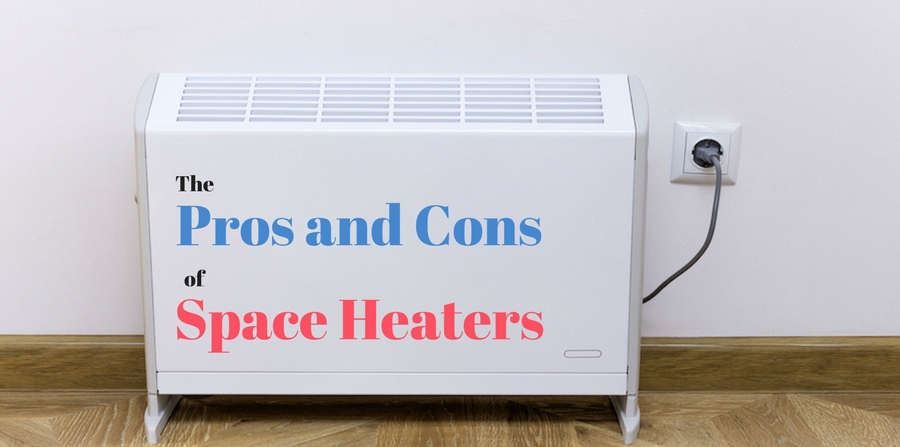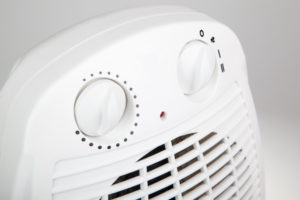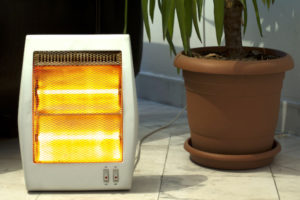Everyone has strong opinions about indoor space heaters. The problem for is, all those opinions can make it hard to get a straight answer about using one. You might hear that everyone should use space heaters in their home… or that indoor space heaters are dangerous and no one should have one in their house.
To clear up the confusion, we decided to go over some of the main pros and cons of using an indoor space heater. If you’re wondering if a space heater could be a good choice for you, consider these advantages and disadvantages before you commit.

Pro: Saves Money
Using a space heater properly can be a great way to save money. Space heaters heat only the area where they’re placed. You put one in the room you’re currently using and it heats that room, usually through convection (or circulation–the same way HVAC heats). You could even use a radiant heater to heat only the area directly in front of the heater.
A space heater use considerably less energy than an HVAC running at the same temperature, which will help you save money on power. You can save more by turning down your HVAC’s thermostat while you have the space heater on. You stay just as warm, but you’re not wasting power heating rooms you aren’t using. The space heater only consumes power when it’s in use, so unplugging it when you’re done saves even more. To maximize effectiveness, purchase a space heater that’s properly sized for your house and uses the safest and most effective power source.
Con: Danger
According to the U.S. Consumer Product Safety Commission, more than 25,000 house fires are started by space heaters every year. Space heaters are in-part responsible for 300 deaths and more than 6,000 burn-related emergency room visits every year. Though most of these accidents can be avoided by paying attention and practicing safe space heater use, many homeowners argue that the potential hazards of space heaters outweigh their advantages.
Homes with babies, small children, large dogs, high foot traffic, or particularly flammable furniture should be especially careful when handling a space heater. Everyone using a space heater should follow these rules:
- Only run the heater when you’re in the room with it
- Only use electric or vented gas space heaters indoors
- Do not connect the heater to an extension cord
- Keep the heater away from flammable objects
- Only use heaters that turns off when knocked over
- Be careful around the heating element
- Read the instruction manual (seriously)
- Choose a heater with a built-in thermostat and timer
- Do not run the space heater overnight
Pro: Simple
Space heaters tend to be simple and elegantly designed. The best home space heaters tend to be electric. They’re cheap, have one plug-in, and generate heat and power only when they’re in use. Space heaters are easy to use; you just plug it into a wall outlet in the room you’re staying in, turn it on, set the temperature the where you want it, and let it do its thing.
A good space heater will have sensors that automatically turn the heat off when the room reaches the desired temperature or after a pre-designated time has passed. If a space heater stops working correctly or breaks, it’s usually easy to figure out what happened. Even if you can’t, space heaters are cheap enough that you could simply replaced the damaged one instead of fixing it. Space heaters should never be considered an adequate replacement for an HVAC unit, but moderate, safe use of a space heater can be a good, simple way to save money and stay warm.
Con: Requires Attention
A lot of research should go into choosing a space heater. If you don’t take size, type, power source, output, maximum temperature, safety features, and design into consideration, the space heater will be ineffective and possibly dangerous. Make sure you’re using a space heater that’s the right size and power for your home.
Once you have the right space heater, be careful with how often you use it and where you put it. Never leave the heater on in an empty room. Make sure to keep it where it can’t be tripped on or knocked over. Monitor how much energy the heater is using by checking your bills month-by-month; if the heater isn’t saving money, it’s not very useful anyway. Never put anything directly in front of the heater or cover up the heating component. Periodically check to make sure the heater isn’t running too hot, or that it isn’t blowing air too violently.
Overall:
Remember: a space heater is not a replacement for your HVAC system. Space heaters are a good tool for limited, specific circumstances if used carefully. Many of the problems space heaters cause occur when they’re used too much or improperly.
Think of a space heater as the inverse of a fan you’d use in the summer. Instead of cooling down a particular room, a space heater can make it warmer. A space heater cannot act as the primary or only source of heat in a space. At best, it’s a helpful little bonus heat.
If you’re having heating problems this winter, give us a call today and we’ll take care of it. If you’re interested in more ways to save money this winter, check out a couple other blogs we’ve done about it. Stay warm!





